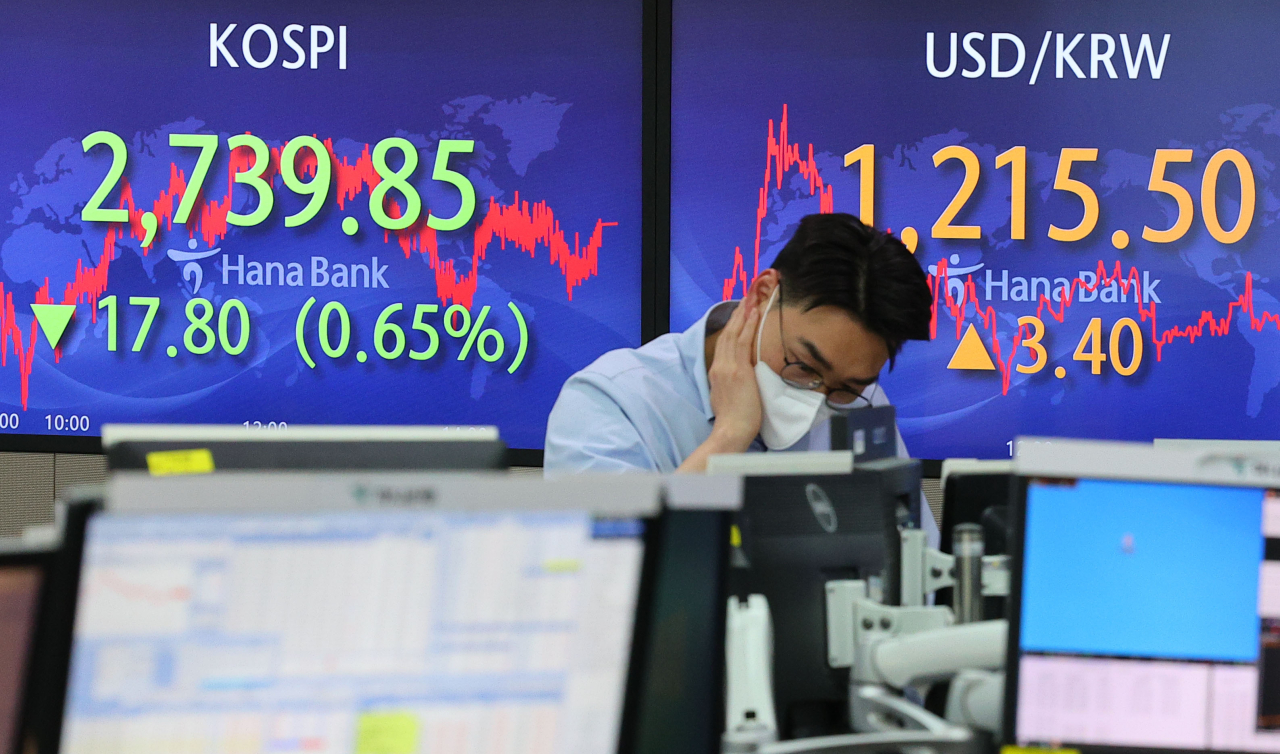 |
Digital boards at Hana Bank`s dealing room in central Seoul shows Kospi price and won-dollar exchange rate on Friday. (Yonhap) |
South Korean equity and bond funds have disappointed investors in the first three months of the year, with many seeing noticeable losses in profitability, data showed Sunday.
Equity funds with over 1 billion won ($819,000) in assets saw an average 7.89 percent loss in profitability since the beginning of the year as of Sunday, data provided by local financial market FnGuide showed. Korean index funds, which closely tracks local stock market indexes saw an 8.59 percent profitability loss in the cited period.
Active stock funds, which periodically rebalances all the stocks to match the proportions found in indexes, saw a 6.29 profitability loss in the same period.
By products, TIGER KRX BBIG K-New Deal Leverage, an equity-trade fund sold by Mirae Asset Global Investments, saw the lowest profitability among its equity fund peers, recording a profitability loss of 35 percent in the first quarter. KODEX Game Industry ETF, which is tied to the metaverse and non-fungible tokens, also shocked investors with a loss of 28.14 percent in the same period.
Local bond funds have been also displaying lackluster performance since the beginning of the year, though significantly better than equity funds. Bond funds with over 1 billion won in assets reported an average profitability loss of 1.05 percent in the first three months.
Treasury bond funds reported an average profitability loss of 2.45 percent, while straight bond funds shed 1.34 percent. KB KBSTAR 30-Years Treasury Bond Enhanced ETF, one of the major treasury bond funds here, reported a 12.89 percent loss in the cited period.
Analysts are citing increased market volatility due to the US Federal Reserve’s growing signaling of monetary tightening since the beginning of the year, coupled with the risks stemming from the Ukraine crisis. The nation’s benchmark Kospi fell 7.99 percent, while the secondary tech-heavy Kosdaq she 9.03 percent in the first three months of the year.
With bonds having an inverse relationship to interest rates, bond funds have been affected by the US Fed’s tapering of its bond-buying and indication of an interest hike as early as March 2022. The BOK has already carried out three rate hikes since August last year pushing up the benchmark rate to the current 1.25 percent.
“The bond market has weakened due to the Ukraine crisis, which has fueled the price of raw materials and concerns of inflation,” Samsung Securities analyst Kim Ji-man said.
“The market is likely to see high volatility for the time-being and will likely calm down only after the nation’s high inflationary pressure becomes subdued,” he added.
By Jung Min-kyung (
mkjung@heraldcorp.com)








